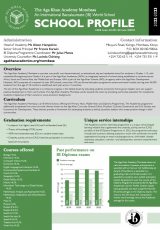Teacher's research published in International Journal of Creative Research and Studies
Johnson Monari, an English teacher at the Academy, had his research paper recently published by the International Journal of Creative Research and Studies in Volume 3 Issue 3. Here, Johnson shares what his research entails and what he hopes will be achieved through it.
 Johnson Monari“With the increasing influence of new technologies in every sector of our lives, its impact on the role of teachers can no longer be ignored. This creates the need for not only continuous professional development for teachers but more importantly studies done in this area. This is the context that inspired the writing of the paper, ‘How teachers’ roles in teaching and learning are redefined by the emergence of new technologies in education’. This paper was peer-reviewed and published by the International Journal of Creative Research and Studies in Volume 3 Issue 3, March 2019. The purpose of this study was to examine the perspectives of teachers on how their roles in teaching and learning are influenced by the emergence of new technologies in education.
Johnson Monari“With the increasing influence of new technologies in every sector of our lives, its impact on the role of teachers can no longer be ignored. This creates the need for not only continuous professional development for teachers but more importantly studies done in this area. This is the context that inspired the writing of the paper, ‘How teachers’ roles in teaching and learning are redefined by the emergence of new technologies in education’. This paper was peer-reviewed and published by the International Journal of Creative Research and Studies in Volume 3 Issue 3, March 2019. The purpose of this study was to examine the perspectives of teachers on how their roles in teaching and learning are influenced by the emergence of new technologies in education.
But why research on technology and the teachers’ role? There seems to be a lot of studies done on how technology is influencing teaching and learning, but with little focus on what teachers, who have interacted with technology, think about their shifting roles in the 21st century. Therefore, the aim of this study was to not only close that gap by amplifying the teachers’ voices, but also capture their diverse experiences that paint a real picture of their 21st century classrooms.
The study demonstrates that teachers are convinced that with the emergence of the new technologies in education, they have three key roles to play: organise learning, offer guidance to students and provide an adult presence to ensure order in learning. It shows that most curriculums and standardised tests are blamed for stagnating teachers as ‘transmitters’ of knowledge rather than facilitators. Administrators and employers in the education sector may benefit from the recommendations of this study, find justification for supporting the educators through training on their shifting roles, and redesign curriculums to undergo a transformational pedagogy that meets the students’ needs in the information society.”
To access Johnson’s paper, click here.





